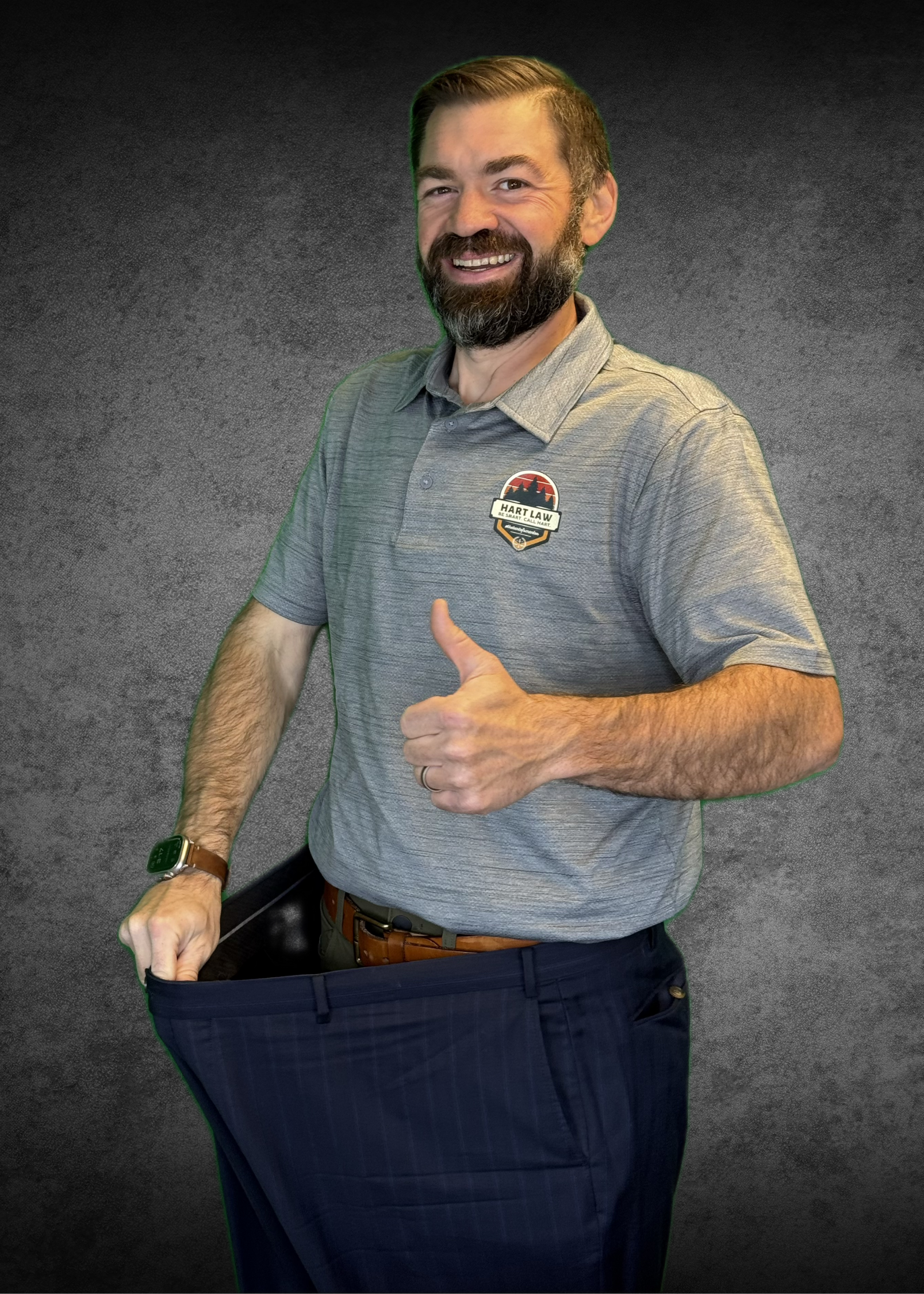
From Lead Balloon to Lighter Than Air: My Year on Zepbound
Sep 17 2025 12:45
Usually, in this column, I talk about a point of law, a policy issue, or something tied to our community through the lens of the legal world. But this month, I felt compelled to address something different—the elephant in the room. Or rather, the absence of him.
For those who know me, you know I’ve been a big guy my whole life, well before Hart Law was even a thing. But over the past year, that’s changed in a very real and visible way. And I didn’t want to let that transformation pass without sharing the story behind it—not because I enjoy talking about myself, but because there’s an injustice here that deserves attention.
I want to educate you about a medication—Zepbound—that has radically changed my life and could change countless others. And I want to shine a light on the troubling fact that many people who need it most are being denied coverage. My hope is that by telling my story openly, more people will recognize this injustice for what it is, and maybe, together, we can fight for fairer access to something that has the power to save lives.
And since we’re talking about “Zep,” let me borrow from a different one you might know: Led Zeppelin. As legend has it, the band got its name after Keith Moon of The Who joked that Jimmy Page’s new project would “go down like a lead balloon.” John Entwistle added, “More like a lead zeppelin.” Page loved the phrase, swapped the spelling to “Led,” and the rest is history. A name meant to symbolize crashing failure became one of the biggest bands of all time.
That irony isn’t lost on me. What was supposed to be heavy actually lifted them up. And in my own way, Zepbound did the same thing for me—it made me lighter. And since Led Zeppelin is my favorite band of all time, when my doctor first told me about something newer than Ozempic called Zepbound, I immediately thought it was fate.
The Hunger Problem I Didn’t Know I Had
My sister is a clinical dietician. She’s given me advice for years about what to eat and how to balance a healthy diet. But here’s the truth: knowledge wasn’t my problem. Hunger was.
I’ve always had a ferocious appetite. Never satisfied. Always thinking about food. And I thought that was just how everyone was wired until I heard a doctor describe the mindset perfectly:
You go out to dinner with your spouse. You both order chicken parm. Your spouse eats half, boxes the rest, and moves on with her night. But you? You clean your plate like it’s a mission. Then you can’t stop thinking about her leftovers. Day 1, you wonder if she’ll eat it tomorrow. Day 2, you’re checking the fridge. Day 3, you start convincing yourself it’s fair game. Day 4, if she throws it out, you’re furious.
That was me—every time. And I didn’t even realize how abnormal it was until Zepbound turned the volume down on those thoughts.
Funny enough, the one real fight my wife and I ever had since we met in 2016 was over me prematurely eating her leftover veal scallopini. Looking back, that should’ve been my wake-up call.
My Starting Point
On August 11, 2024, I weighed 340 pounds. Not my personal highest, but close. (Law school had me fluctuating like crypto—up one week, down the next, volatile as hell.)
People love to say: Just stop eating. Go on a diet. Exercise more. Easy words, impossible execution when your hunger switch is broken.
That’s why Zepbound changed everything. Unlike Ozempic or Wegovy, which use semaglutide (originally made for diabetes and later found to suppress appetite), Zepbound uses tirzepatide. It does two things: curbs appetite and keeps you feeling full longer. And importantly—it was labeled for weight loss, not just diabetes.
With a BMI of 46, my doctor said I was a no-brainer candidate. We went through the usual dance: prescription, insurance prior authorization, approval. It took about 7–10 days. At the time, I thought it was routine. Later, I learned just how lucky I was.
The First Shot
My first dose was Sunday, August 11. I’d researched obsessively (my wife would call this my “due diligence phase” that kicks in before I commit to anything).
I’d read forums, Reddit threads, and personal accounts. A lot of people injected in their stomach, but I couldn’t stomach (pun intended) that idea. Why? As a kid, I watched family members with diabetes shoot insulin into their bellies. That image stuck with me. I couldn’t separate it. The thigh felt more approachable, so that’s what I chose. Sunday nights, 7 p.m., like clockwork.
Side effects? None for me.
And then came Monday night. My in-laws were in town, so we had homemade lasagna with roasted broccoli. I cut myself a smaller piece, ate half, and stopped. More shocking—I didn’t spend the rest of the night obsessing about the leftovers in the fridge. That had literally never happened before.
For years I told my sister, “I can’t wait for the miracle drug.” Turns out, it finally exists.
The Daily Grind
Once I got started, I committed fully. I logged every single thing in the Lose It app—food, water, weigh-ins.
I even set a “joke” goal: 184 pounds. That’s the number the outdated BMI chart says I should weigh to be “normal.” My sister and doctor both dismissed BMI, but insurance companies still cling to it. So I figured, why not?
Here’s what my routine looked like almost every day for over a year:
- Breakfast: Fairlife protein shake (30g protein), 18 oz black coffee.
- Lunch: 40 grams of homemade jerky (beef or pork). I trim the fat, freeze, slice, marinate overnight, then dehydrate. Portion it out into bags—it costs me $25 and lasts two weeks.
- Dinner: Whatever I wanted, but portion-controlled—3–4 oz protein, 3 oz carb, 3–4 oz vegetable. Cooking has always been my passion, and thankfully Zepbound didn’t kill that joy.
- Snacks/Dessert: Rare, but sometimes a piece of dark chocolate with my wife before bed.
If I had drinks at happy hour, I logged them and adjusted my dinner. Usually, Monday and Tuesday dinners were salads with no carbs to offset the weekend.
That was it. Nothing flashy. Just consistent.
The Result
On August 20, 2025, just a year and a week after I started, I hit 184 pounds. Nearly 160 pounds gone.
But the story doesn’t end there.
What Shocked Me
I started telling everyone I knew who was overweight: “Talk to your doctor about GLP-1s.” No shame, no secrets. Because here’s the thing: obesity isn’t a secret. You wear it. Everyone sees it.
But what floored me was how many of my friends and family—people with worse health conditions than mine, some even on the same insurance plan—were denied.
How does that make sense? I was relatively healthy aside from my weight. No diabetes, no high blood pressure, no cholesterol issues. Meanwhile, people with multiple comorbidities—who arguably needed it more than I did—were turned away. Turns out GLP-1 insurance denial was a thing.
The only explanation that makes sense: money.
Take a local health system, whom I will not mention by name, for example. They list GLP-1s on their formulary but generally prohibit their providers from prescribing them. Why? My guess is because if people lose weight through medication, they won’t need costly procedures and elective surgeries. And that means lost revenue.
And here’s the kicker: this unnamed, but well-known health system even conducted a study on GLP-1s and gastroenterology procedures. They looked at tens of thousands of patients undergoing endoscopy (EGD) and concluded that people on GLP-1s were “at risk” because food stayed in their stomachs longer.
But that’s the entire point of GLP-1s. They delay gastric emptying to help you feel fuller longer. It isn’t a dangerous flaw—it’s the mechanism. To frame that as a reason not to use the drug is like criticizing a seatbelt because it restrains you in an accident.
If a patient needs an endoscopy, there are simple medical protocols for fasting or adjusting timing to account for delayed gastric emptying. That’s not a reason to block access to the drug. It’s a reason to plan accordingly—like doctors already do with countless other medications and conditions.
And to show just how egregious that logic is, let me ask this:
We all agree cancer is bad. For decades, scientists have been racing to cure it. But imagine, for a second, they actually succeed. They finally cure cancer. Would health insurers allow patients to take that miracle drug—knowing they’d lose money by not treating cancer for years on end?
I struggle to see the difference. Blocking people from life-changing medication because it works too well is just as backward. This clear departure from logical thinking doesn't pass the smell test. It gives off a strong potential for a bad faith claim. These GLP-1 insurance denials perhaps sound ripe for a class action because we all know that a successful hit to a major corporation's wallet is one of the most effective ways to effectuate change.
Closing Thoughts
I’m grateful I found Zepbound. But I also know I got lucky. The system is broken. People who desperately need this medication are being denied for no good reason. Insurance companies hide behind arbitrary policies while lives hang in the balance.
For me, hunger no longer rules my life. For others, access is still the biggest battle. And that has to change.
Disclaimer: I’m not a medical professional. This drug worked wonders for me, but everyone’s body is different. If you’re considering it, talk to your doctor to see if it’s right for you. I sincerely hope it is—because, wow, it can change everything.
